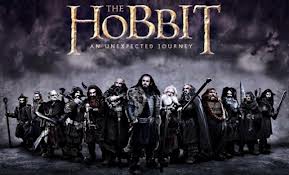 So here we are: The Hobbit is officially out. I haven’t seen it yet, but the hour draws nigh. I can’t wait.
So here we are: The Hobbit is officially out. I haven’t seen it yet, but the hour draws nigh. I can’t wait.
I recently saw a few films that reminded me of the power of Tolkien’s tale, which traffics in good and evil and other such outmoded concepts. It’s nuanced, but it’s stubbornly traditional in that it features heroes and villains. It’s very common nowadays to “complexify” leading characters such that they are, like a child’s first stab at a watercolor, a confused array of bad and righteous. One moment they are acting heroically; the next they are caving morally. It’s all very hard to follow.
A natural Christian response to this trend, this mainstreaming of amorality, would be to decry it. That would be a merited response. But here’s the thing: all these anti-heroes and darkly shaded characters are interesting for a while. Perhaps a long while. But in reality, they pale in comparison to a true hero. The Christ-type speaks to all of us at some level. We are made in God’s image, and there is something inherent in the human condition that cries out for honesty about sin, yes, but more significantly desires a conquering king. We’re hard-wired to cheer for the savior.
All of which renders amorality banal. Boring, ultimately. Confusing. Sure, we’re all a mixture, a mixed bag. I get that. But that’s not what the heart aspires to in its quiet moments. Even outside of Christ, we see dimly the need for true goodness. We want the great myths of salvation and liberation to be true. Of course, in our sin, we don’t necessarily want to submit to the rule of the hero; we might find redemption more appealing in the abstract than the particular. In fact, I think that’s what you could say our Adam-inherited sin nature leads us toward. We’re all for transformation and rescue, but only in so far as it goes.
This does not obscure the point, though. Amorality is banality. It ends up being boring. It inevitably goes out with a whimper, not a bang, while the self-sacrificial Christic heroes–whether intentionally constructed along these lines or not–endure. Harry Potter, Iron Man, Batman, Frodo Baggins, Aragorn (man it feels good to write these names again), Gandalf–these are the figures that inspire us. To varying degrees, their goodness puts a lump in your throat. Makes you want to be something greater. Makes you want to leave the theater and withstand evil in your own little corner of things. Goodness, you see, is exciting, as Jonathan Edwards showed in his stratospheric book on “true virtue” (it is a beast of a text, but it’s eye-opening). It’s moving. It’s vivifying.
Righteousness sings.
Some Christians will respond by saying we’re a mixed bag, though, so we don’t really want to support unrealistic characters. That’s fine as far as it goes. But the center of our faith is blazing. His name is Jesus Christ. He’s pure good. And you know what? He’s in the business of making sinners like you and me new creations (2 Cor. 5:17). His cross has “crucified” our old nature (Rom. 6:6). So while sin still tempts us and causes us to stumble, we are not 50% good/50% evil as redeemed people. We are new. We are counted righteous. The Holy Spirit is transforming us and enabling us to live in victory as conquerors despite earthly trials (Rom. 8:31-39). So at the end of the day, I want to be careful about how I think about my nature. You and I are not anti-heroes. That’s not what the Spirit creates when he moves on a sinner.
Sure, before grace strikes, we’re evil people. But then why would Christians support morally conflicted anti-heroes as the ideal? We shouldn’t. We really and truly should love goodness and moral excellence. Even as evangelicals, we are way too cynical, distrusting, disbelieving, and mocking toward purity. Like the broader culture, we’ve gone way overboard when it comes to virtue; we sneer at it. That’s dishonoring to God. It’s a lie, furthermore. There really is good in the world. There really are people who persevere to the end. There are husbands who kill adultery as it lies in wait for them and who stay faithful to their wives all their days. There are women who genuinely love their families and kill selfishness on a daily basis.
You may have been scarred by a rough church experience or a bad home. I empathize with you if so. Such fruits of sin do scar us and leave us distrusting, sadly, of those who claim to be good. But that does not–must not–mean that there is no good in the world, and that there are not gospel-created Christians who consistently live out a godly life.
All this to say: amorality is boring. It’s not the murky folks who have the fun. It’s not the hedonists who get the joy. It’s Christians who know true delight, albeit delight of a regularly self-sacrificial nature. True pleasure is not in living a perpetually conflicted existence that allows you to sample sin, lurch after virtue, and then return like a dog to vomit to evil. True pleasure is in holiness, purity, moral excellence, spiritual piety, godly devotion, care for others, gospel truth, biblical wisdom, church fellowship, self-discipline, and worshipping the Triune God.
Now if you’ll excuse me, I need to get back to my Hobbit countdown, and to singing this song multiple times a day to my justly startled wife.










